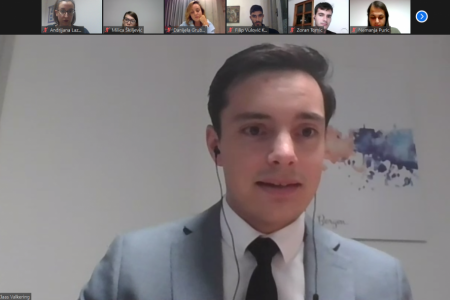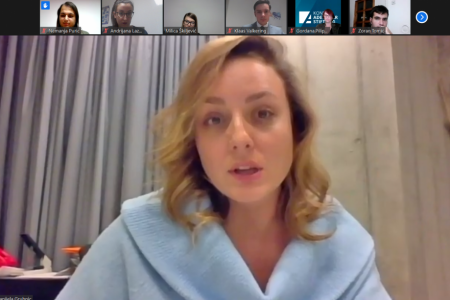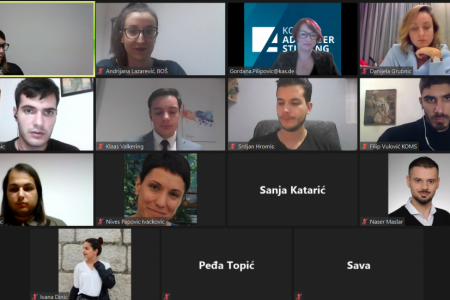PolitiKAS debate: On integration into the new society and youth engagement in the EU
The fourth debate on what is provided to youth: the EU perspective, was held on Tuesday, October 27th, 2020, through the ZOOM platform. Danijela Grubnić, project manager at the University of Economics and Business Vienna, Austria, and Klaas Valkering, vice president of the CDA youth from the Netherlands, presented their knowledge and experiences on the mentioned topic. The debate was moderated by Milica Škiljević, project manager at the Belgrade Open School.
Youth in Serbia, but also at the EU level, face similar problems and challenges. Political apathy and insufficient involvement in democratic processes are common for youth all over the world. How political parties try to encourage young people to get politically engaged, but also what is offered to immigrants when it comes to their full integration into the society of the country to which they emigrated - were some of the topics discussed in the debate.
Danijela Grubnić, as someone who emigrated to an EU member state more than a year ago, shared her experience on moving to Vienna "as a way to get to know how Europe breathe, live and work and to offer herself the opportunity to further professional development“. As a positive example of the way in which Vienna, but also Austria as a whole, strives to integrate immigrants into the community, Daniela especially pointed out the personalized communication that local authorities have with their citizens. "The municipality regularly informs citizens about all the news and possible changes within the area in which you live, as well as about language learning courses and other forms of training offered in your district." There is also the opportunity that every citizen who lives for more than 6 months on the territory of Vienna has, and that is to be "invited to a meeting with local representatives, where you have the opportunity to present his ideas for improving the community in which he lives." Thus, dealing with individuals and groups in a personalized and dedicated way is a good model for deeper integration of immigrants. Danijela added that one of the benefits of leaving Serbia is that you “can connect ideas and people".
What are the stance of youth living in the EU towards the EU?
Speaking from the perspective of youth who were born and live on the territory of the EU, Klaas Valkering pointed out that "the EU is a kind of norm for youth in the Netherlands and the EU has always been there”. When they were born, in their childhood, while they were educated and now when they are professionally improving and developing. Respect for the four basic freedoms has always been there and something that is a part of the everyday life of every citizen of the Union and something that will always be there. In political terms, relations with the European Parliament in the Netherlands are extremely low. Most young people do not know who sits in the European Parliament or do not differentiate between institutions and do not know which spectrum of political parties exists at the EU level, although the education system provides information about the EU and politics in general. This leads to the point where young people generally don’t vote. For political parties, this means that youth should be involved in political life at the European level, while on the other hand, it is difficult for youth to understand the fact that they can somehow influence events at the European level" Klaas stressed. What is noticeable is that the situation is different with youth who emigrate to the Netherlands. They are usually very well acquainted with the way the EU works, with its values, the opportunities it provides for young people. For example, in larger cities where there are universities, mostly international students are the first to come to political gatherings because they understand EU values much better, "Walkering concluded.
How do the youth sections of the political parties in Europe function?
Klass Valkering, as the president of the youth sections of the Dutch CDA party, pointed out that "in the Netherlands, unlike Serbia, the youth of political parties, although they carry out a large part of their activities together with the main party, still retain a certain level of autonomy in dealing with potential voters." In certain areas they represent views that are sometimes even in conflict with the main party. In this way, the youth of the party can influence the "mother" party to change its platform/position related to some issues. Youth sections of different parties are also trying to work together in order to address the problems the youth are facing.
As for motivation, Klaas pointed out that "a strategy that includes involving citizens work from the basic, local level on the basis of topics that could interest citizens and lead them to take part in political processes."
An example of good practice - encouraging youth in the Netherlands to become more involved in their communities
In the Netherlands, political activists and parties try to engage youth by trying to link them to an issue and topic, Klaas pointed out, adding that "specific topics and problems are important to young people in the Netherlands", and not which party supports it. Young people prefer to use practical ways of communicating with politicians and what we are applying now is the greater influence of social networks on politics. It is important for young people in the Netherlands today to make their own movements and platform in a city, on a topic and then when they come across the fact that changing things without political parties is difficult, then they use political parties more as a means to convey their message. .hey want to found their own movements and work on their own, and political parties, on the other hand, like to incorporate existing influential, young people into their structures."
So, "we can fight against the apathy of young people with realism by showing young people that what we promise to really come true, while taking into account the problems of youth" "Information must be achievable, because that is the only way to gain and maintain the connection of youth" Klaas concluded.
For more information on upcoming debates, follow our site.
Tel: 381 11 3065 800
E-mail: politikas@bos.rs
Bulevar oslobodjenja 177
11000 Belgrade




